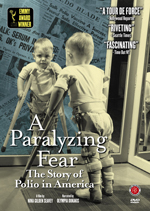 |
Hilleman: A Perilous Quest to Save the World's Children
A film by Donald Rayne Mitchell 67 minutes, color, 2016
|
||||||||||
 |
|||||||||||
| Synopsis
The 20th century was a dangerous time to be young: a multitude of diseases too often kept children from reaching even their teenage years. Millions suffered and died. From that environment one man would emerge to lead a revolution in vaccine innovation that would save many millions of young lives every year; the greatest scientist of the 20th century, and no one knows his name. Watch the Trailer
Reviews "It would have been tough on mankind if we didn't have Maurice Hilleman." - Anthony Fauci, Director of The National Institute of Allergy and Infectious Diseases "Maurice Hilleman is the ideal American success story." - David Oshinsky, Pulitzer Prize-Winning Author Listen to Radiolab's podcast, The Great Vaccinator, about vaccine pioneer Maurice Hilleman. Disc Features ● Nine Animated Short Films, including How Viruses Attack Cells, How Antibodies Work, and Using Genetic Information to Make Vaccines
|
|||||||||||




